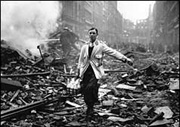 |
| The population of the East End remained defiant through months of bombing |
| 1940: London blitzed by German bombers |
England have
The German air force has unleashed a wave of heavy bombing raids on London, killing hundreds of civilians and injuring many more.
The Ministry of Home Security said the scale of the attacks was the largest the Germans had yet attempted.
"Our defences have actively engaged the enemy at all points," said a communique issued this evening.
"The civil defence services are responding admirably to all calls that are being made upon them."
The first raids came towards the end of the afternoon, and were concentrated on the densely populated East End, along the river by London's docks.
About 300 bombers attacked the city for over an hour and a half. The entire docklands area seemed to be ablaze as hundreds of fires lit up the sky.
Once darkness fell, the fires could be seen more than 10 miles away, and it is believed that the light guided a second wave of German bombers which began coming over at about 2030 BST (1930 GMT).
The night bombing lasted over eight hours, shaking the city with the deafening noise of hundreds of bombs falling so close together there was hardly a pause between them.
One bomb exploded on a crowded air raid shelter in an East London district.
In what was described as "a million to one chance", the bomb fell directly on the 3ft (90cm) by 1ft (30cm) ventilation shaft - the only vulnerable place in a strongly-protected underground shelter which could accommodate over 1,000 people.
About 14 people are believed to have been killed and 40 injured, including children.
Civil defence workers worked through the night, often in the face of heavy bombing, to take people out of the range of fire and find them temporary shelter and food.
An official paid tribute to staff at one London hospital which was hit, saying, "They showed marvellous bravery, keeping on until bomb detonations and gunfire made it absolutely impossible."
In the air, a series of ferocious dogfights developed as the German aircraft flew up the Thames Estuary.
The Air Ministry says at least 15 enemy aircraft crashed into the estuary, and in all, the Ministry said, 88 German aircraft were shot down, against 22 RAF planes lost.
|